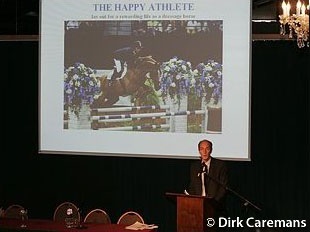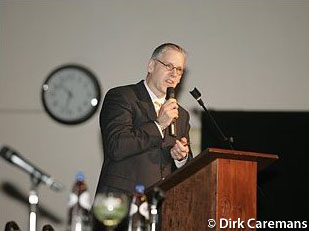
Three presentations on the second day discussed the concept of "Happy Horse" in detail. From Dirk Willem Rosie of the KWPN Studbook, and physiologist Dr Eric van Breda came a thought provoking
scientifically based examination of how the horse can be a "happy athlete" and how that can be achieved.
Dirk Willem Rosie emphasized the role of correct physical conformation and temperament and stated: " It is the task of studbooks to realize these requirements and provide dressage riders with good horses " so that the horse is never over-demanded." For Rosie, "happiness" meant mainly a physical experience of happiness.
A correct uphill conformation proved to be vital for a horse to be happy in doing dressage. Lightness of the forehand is more easily achieved by long legged horses with a neck raised according to the degree of collection. Rosie indicated several key factors in the skeletal structure of the horse which generally lead to more successful dressage horses, such a more a flatter pelvis and a sloping femur to carry more weight on the hind legs.
The Happy Horse Mentally
 Dr Eric van Breda, a specialist in comparative human and equine training and exercise physiology, emphasized that 'happiness' cannot be measured in equine athletes in the same way as in human athletes. A horse has no concept of training for a goal, and does not fill out questionnaires! As basic level, it can be described as the absence of stress, but "from a scientific point of view, measuring 'happiness' needs a lot more research, including out of competition testing and measurement."
Dr Eric van Breda, a specialist in comparative human and equine training and exercise physiology, emphasized that 'happiness' cannot be measured in equine athletes in the same way as in human athletes. A horse has no concept of training for a goal, and does not fill out questionnaires! As basic level, it can be described as the absence of stress, but "from a scientific point of view, measuring 'happiness' needs a lot more research, including out of competition testing and measurement."
Backing up the results of Rosie's survey of 700 small tour riders who noted zealousness, sensitivity and perseverance as necessary attributes for a horse to be success in dressage, reigning Olympic champion Anky van Grunsven added that in her experience of Bonfire and Salinero, the most sensitive horses are also the most spooky and nervous. She reinforced the importance of dealing with a potential negative side by building the horse's trust in a calm rider.
Van Breda also added that according to the survey, it was important that a happy horse can not be spooky, as fear is not associated with harmony, happiness, steadiness and trust.
Van Breda compared dressage to other late specialization sports, such as cycling and athletics, as these disciplines involve specific steps for the athlete to take. They include: Learning to train (daily routine), training to train (on the way to being an athlete), training to compete, training to win and finally retirement/retraining.
Text by Eurodressage (partly FEI press release) - Images copyrighted: Dirk Caremans